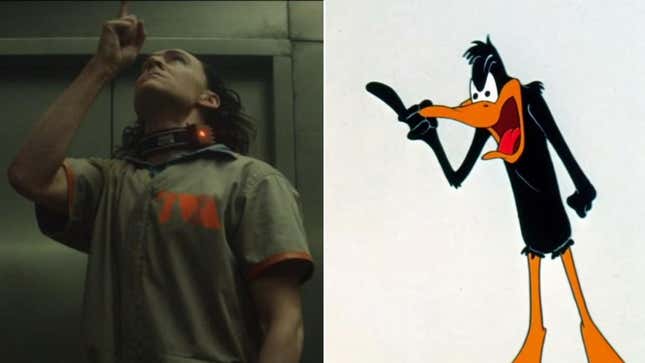
“Puny god.”
It’s not just a bit of iconic, oxymoronic Hulk-speak—it’s shorthand for the most important moment in Loki Laufeyson’s fictional life. That line, from 2012’s Avengers, is muttered by Mark Ruffalo’s big green rage monster just seconds after unleashing one of superhero cinema’s most satisfyingly memorable beatdowns, turning Tom Hiddleston’s supremely arrogant godling, who’s spent the film smugly lording his superiority over an entire planet, into a divine chew toy whose biggest impact on the universe is likely to be the dents his battered body leaves in Tony Stark’s penthouse floors. The accompanying reaction shot, which sees Hiddleston make full use of his big eyes and elastic face to convey a profound sense of “What the fuck just happened to me?” not only cements the truth that Loki’s pretensions of master villainy were just another self-imposed illusion: They also make it clear that there’s as much cartoon character lurking in his DNA as frost giant. Lying in a Loki-shaped hole, he’s not, and never could be, the Big Bad of anything. Instead, he’s the Marvel Cinematic Universe’s answer to the greatest pompous, prissy, perennial pop culture loser of all time: Daffy Duck.
Don’t believe us? Watch Hiddleston’s body language in the opening moments of his brand new Disney+ show, which sees the renegade Asgardian shoved through an assembly line of bureaucratic trapdoors and contraptions so slapstick it might as well have Raymond Scott’s “Powerhouse” playing underneath it. Beset on all sides by a universe of absurdity, Hiddleston lets his chops as a physical comedian come to the forefront, with every attempt to re-assert his dignity, whether with a haughty look or an accusing finger pointed toward the sky, met with an even heartier smack back down from the powers that be. It’s the “puny god” moment in miniature, and repeated ad infinitum—and a classic page from the book of Mel Blanc’s endlessly put-upon water fowl, the master of asserting “I deserve respect!” in the face of a universe that keeps giving him a definitive, cheerfully callous “Nah.”
Part of the joy of Loki is in seeing Hiddleston let this part of the character come to the forefront, playing into the insecure goofball peeking out underneath all that arrogance, sneering, and big, pointy hats. It’s a register he’s gotten to work in before—most notably in Taika Waititi’s Thor: Ragnarok—but never with as much flop-sweaty silliness as when shoved into the hands of the Time Variance Authority, an organization that treats the presumptive “god-king” with all the indifference with which he so casually dismissed all those pathetic earthlings. Hiddleston can turn the aristocratic blue blood on and off like he’s got it on tap, and his cycle of failures in “Glorious Purpose” is a minor masterclass in puffing up a prodigious ego, only to deflate it like a collapsing whoopee cushion every time he’s reminded how unimportant he actually is to the universe at large.
Owen Wilson’s Agent Mobius says as much, during the extended interview that makes up the bulk of Loki’s first episode. An apparent scholar of everybody’s favorite adopted Asgardian, Mobius has accurately pegged Loki’s role in the Marvel Cinematic Universe: He’s the heel, the guy who loses “to make other people better.” (The Daffy, to return to the metaphor, to the various Avengers’ Bugs.) It’s a kind of purgatory to be trapped in, one that the god himself views in fast-motion when left to watch the future he’s inadvertently ducked out on: Loss, loss, redemption… and then one more, terminal, loss, a final sacrifice to ensure his doofus brother has a proper motivation to fight when the Infinity War rolls around. But there’s a paradoxical sort of power in the part of the perpetual loser, too, one that Hiddleston, and Loki, seem eager to tap into. After all, who actually likes Bugs Bunny?
It’s not easy to be an underdog in the Marvel Cinematic Universe, a world where even plucky, poor Peter Parker is the hand-picked scion of the planet’s richest man. The only way to be a lovable loser, in other words, is to actually lose, and that’s an advantage Loki’s got the market cornered on. (Actually surviving all his encounters with various superheroes probably helps; being an MCU villain is a good trick, as the old saying goes, but you can usually only do it once.) Loki’s spent the last nine years as a literal punching bag for Earth’s mightiest heroes, dusting himself off again and again despite all. Sure, he’s a jerk—and, as Mobius pointedly returns to, more than once, a killer—but that mostly just means it’s easier to see our own inner Daffys reflected back at us through him. Combine that with his other great advantage—Hiddleston himself, who’s spent the better part of a decade finding all the silly, scary, sad, human edges to the character that he puts on display in “Glorious Purpose”—and you have what might be the biggest paradox of them all: A world where Daffy Duck—or his nearest puny, but divine, equivalent—might actually score a win.